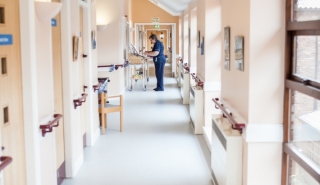In this section
Speech and language therapy stroke services
What is a stroke?
A stroke is a brain attack. A stroke is what happens when the blood supply to part of the brain is cut off. Blood carries essential nutrients and oxygen to the brain. Without a blood supply, brain cells can be damaged or destroyed and won't be able to do their job.
Because the brain controls everything the body does, damage to the brain will affect body functions. For example, if a stroke damages the part of the brain that controls how limbs move, limb movement will be affected.
The brain also controls how we think, learn, and feel. A stroke can affect these mental processes. Many people will also find that their speech, language and swallowing (dysphagia) have been affected following a stroke.
What do we do?
Inpatient speech and language therapy
- To assess in order to identify who will benefit from therapy at the inpatient stage
- To provide communication support to help people access other therapy services in order to aid discharge planning
- To assess and manage swallowing difficulties (dysphagia)
- To liaise with family and carers and to contribute to family meetings
- To provide training to other healthcare professionals on how best to support people with communication and swallowing difficulties
On transfer home
- We offer assessment and therapy, with support from rehabilitation assistants if required
- We work alongside other disciplines as part of a multi-disciplinary team in order to provide a more effective and personalised service
We run communication groups, enabling clients to continue with current therapy goals or at the end of therapy as an opportunity to interact and develop communication skills within a supportive setting
- Difficulty with language is known as aphasia or dysphasia.
- Difficulty with speech is known as dysarthria.
- Difficulty with speech programming is known as verbal dyspraxia.
- Difficulty with swallowing is known as dysphagia.
Useful links







